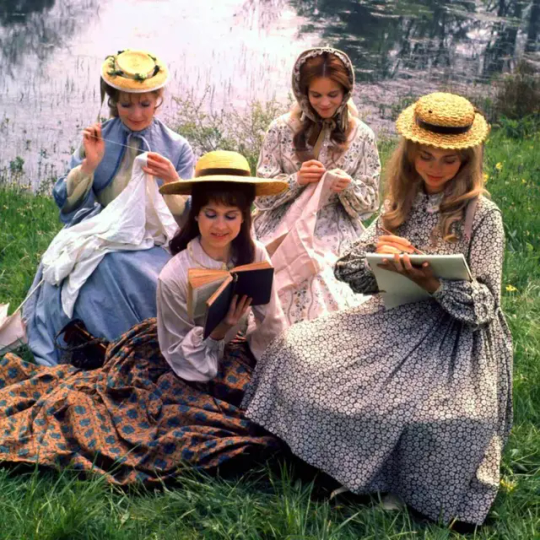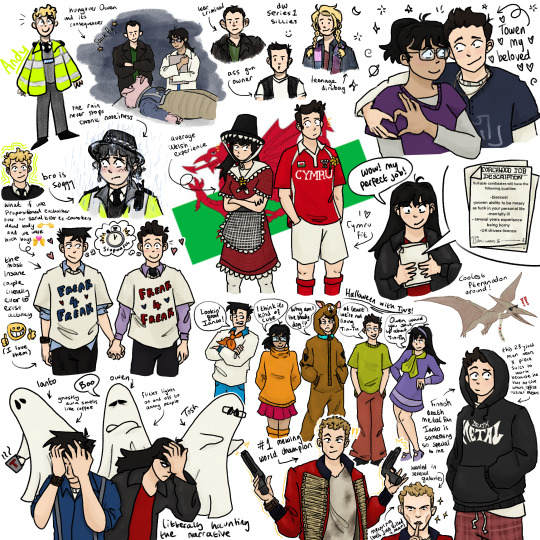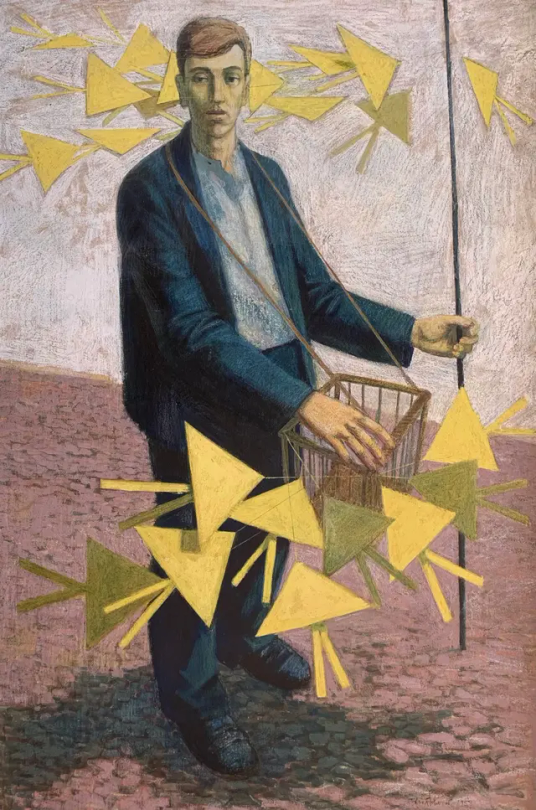#john welsh
Explore tagged Tumblr posts
Text

Valentine R.I.P. by John Welsh
Our pig, Valentine, recently died, so we had to have a painting of the old guy in memory. enjoy xx
57 notes
·
View notes
Text
"LITTLE WOMEN" (1970) Review

"LITTLE WOMEN" (1970) Review
It is very rare to find a British adaptation of an American novel. It is even rarer to find more than one adaptation. Louisa May Alcott's 1868 novel, "Little Women" must have been very popular with the BBC network. The latter had adapted the novel four times. Several years ago, I had seen the network's 2017 version. I thought it was the only version adapted by the BBC . . . until I had stumbled across the 1970 adaptation.
Set during the 1860s decade, "LITTLE WOMEN" told the story of the four March sisters of Concord, Massachusetts and their coming of age stories during and after the U.S. Civil War. With second daughter Josephine aka Jo serving as the story's main protagonist, the miniseries focused on the sisters' struggles with the family's diminished finances, their personal ambitions and especially their love lives. Early in the story, the March sisters become acquainted with their neighbor, one Theodore "Laurie" Lawrence, grandfather Mr. Lawrence and his tutor, John Brooke. Whereas third sister Beth develops a friendship with the elderly Mr. Lawrence, oldest sister Meg falls in love with Mr. Brooke, and the youngest Amy develops from a slightly vain and coddled child to a mature and self-assured young woman. As for Jo, the story focused on her development from a temperamental and stubborn girl, who learns to maintain her hot temper, navigate through her relationships with two men and adhere to her ambitions to become a writer.
Another surprising aspect of "LITTLE WOMEN" that I had learned was that it was the longest adaptation of Alcott's novel with a total running time of 225 minutes. This gave screenwriters Alistair Bell and Denis Constanduros to be as faithful to Alcott's novel as possible. Were they? Somewhat. The pair did take care to explore Laurie's volatile relationship with his grandfather - something that a good number of the other adaptations had failed to do. And it allowed glimpses into his growing relationship with Amy in Europe. Also, the early stages of Meg's marriage to Mr. Brooke ended up being explored, something that only the 2019 movie adaptation had repeated. I believe the miniseries did a very solid job of conveying these aspects of Alcott's novel.
But the miniseries left out Meg and Laurie's experiences at Annie Moffat's party. The miniseries also left out the sisters meeting with Laurie's English friends - something only the 2017 adaptation had included. Bell and Constanduros had changed the time period of Amy's near drowning at Walden Pond from the winter to either the spring or summer, allowing a rickety pier to send her into the pond, instead of thin ice. And it never touched on Amy's violent encounter with her schoolteacher over pickled limes. Did these aspects of the screenplay harm the production? Hmmmm . . . perhaps not. But I do feel that the miniseries' increased emphasis on the Lawrence men's relationship came dangerously close to overshadowing the March sisters' own relationships. I am relieved that the miniseries managed to focus somewhat on Jo's relationship with Professor Bhaer. However, I do have a problem with the sexist manner in which Constanduros and Bell had the professor viewed his future marriage to Jo. Whatever admiration Professor Bhaer had for Jo's writing skills seemed to fly out of the window in his anticipation of her being a good wife. Superficially, I had no problems with the brief focus on Meg and John's marriage, even if it could have been somewhat more thorough. But I believe it exposed what I believe was one of the miniseries' main problems.
"LITTLE WOMEN" did have its share of problems. Like the 1978 television adaptation, it is clear to see that it suffered somewhat from a low budget. If I must be frank, that seemed to be more obvious in this adaptation. Aside from Amy's near drowning at Walden Pond and some of European settings featuring Amy and Laurie, all other scenes had obviously been shot inside a studio. Very disappointing, considering a good number of BBC productions featured a mixture of interior and exterior shots. I found the actresses' makeup and hair - especially the latter - to be inconsistent and frankly, a big mess. Betty Aldiss' costume designs seemed solid enough, but not particularly earth shattering. Although the cast solely featured British performers, I believe a handful of them managed to handle American accents quite well - especially Stephen Turner, Stephanie Bidmead and Martin Jarvis. But despite their solid or excellent performances, the rest of the cast seemed to struggle maintaining one. And could someone please explain why three of the actresses who portrayed the March sisters seemed to be incredibly loud? Nearly every time one of them spoke, I had to turn down my television's volume. Some have explained these scenes featuring quarreling between the four sisters. They have even gone as far to claim this adaptation was the only one that featured the sisters often quarreling. Well, they would be wrong. Nearly every adaptation (I am not certain about the 1933 movie) of Alcott's novel featured quarrels between the sisters. So, this explanation does not strike me as a good excuse for the loud voices.
Judging from the previous paragraph, one would assume I have a low opinion of the majority of performances featured in "LITTLE WOMEN". Not really. Most of the performances featured in the miniseries struck me as pretty solid. Actresses Angela Down ("Jo"), Jo Rowbottom ("Meg"), Janina Faye (Amy) and Sarah Craze ("Beth") all gave solid performances and managed to capture the nuances of their individual characters in a competent manner. As I had stated earlier, I had a problem with most of them - with the exception of Craze - resorting to loud and histrionic voices in their portrayals of the March sisters at a younger age or in the case of Rowbottom, engaged in a heated quarrel. I thought Jean Anderson gave a solid performance as the stuffy Aunt March. Frederick Jaeger gave a very likeable performance as Jo's love interest, the intellectual Professor Friedrich Bhaer. And I believe the actor had a solid screen chemistry with Down. I really had a problem with actress Pat Nye, who portrayed the family's housekeeper, Hannah. Nye's handling of Hannah's American accent struck me as ridiculously exaggerated . . . to the point that her accent almost seemed Southern. Patrick Troughton, a talented actor in his own right, had more or less been wasted in his role as the family's patriarch, Mr. March. I do not believe he had spoken more than three to five lines in this production.
I can think of at least four performances that really impressed me. It seemed a pity that not one of them came from the four actresses who portrayed the sisters. Oh well. John Welsh has my vote as the second best version of Mr. James Lawrence, the March family's wealthy neighbor. I thought he did an excellent job of developing his character from a strict and curmudgeon guardian to a warm-hearted man who learned to develop a relationship with his grandson. Most portrayals of John Brooke, Meg's future husband, have never impressed me. But I must say that I found Martin Jarvis's portrayal of the character more than impressive. The actor was given an opportunity to delve more into Mr. Brooke's personality and he ended up giving one of the better performances in the miniseries. If given the chance to vote for the best performance in "LITTLE WOMEN", I would give it to Stephen Turner for his portrayal of the sisters' close friend, Theodore "Laurie" Lawrence. I suspect Turner had greatly benefited from Bell and Constanduros's script, which seemed more interested in Laurie as a character than the four leads. But judging from Turner's performance, I suspect his would have overshadowed everyone else's due to the actor's superb handling of the character. I also have to compliment Stephanie Bidmead's portrayal of the March family's matriarch, Mrs. "Marmee" March. Not only did I find her performance warm and elegant, but it also lacked the dripping sentimentality of the earlier versions and the heavy-handed attempts to make the character "modern" - relevant to today's movie and television audiences.
"LITTLE WOMEN" had its flaws. I cannot deny this. But I feel its flaws - which included a limited budget and some questionable American accents - were not enough to dismiss the nine-part miniseries as unworthy. I believe the 1970 miniseries proved to be a lot more solid and entertaining than some fans of Alcott's novel believed, thanks to Paddy Russell's competent direction, a damn good screenplay by Denis Constanduros and Alistair Bell, and a first-rate cast led by Angela Down.
#costume drama#period drama#period dramas#little women#little women 1970#louisa may alcott#little women bbc#jo march#angela down#meg march#jo rowbottom#janina faye#amy march#sarah craze#beth march#stephanie bidmead#stephen turner#martin jarvis#frederick jaeger#patrick troughton#pat nye#u.s. civil war#john welsh#paddy russell#denis constanduros#alistair bell
9 notes
·
View notes
Text
youtube
FALTOU VERBA: O VIKING (THE NORSEMAN, 1978)
#dicasdefilmes#filmes#filmesclassicos#filmesclássicos#filme#filmeseseries#film#1970s#dicadefilmes#dicadefilme#dicas#dica#filmesmarcantes#streaming#streamingmovies#THE NORSEMAN#vikings#Charles B. Pierce#lee majors#Cornel Wilde#Denny Miller#John Welsh#Sandy Sanders#Jack Elam#Mel Ferrer#Christopher Connelly#Susie Coelho#Kathleen Freeman#Jesse Pearson#Seamon Glass
2 notes
·
View notes
Text









W A T C H I N G
I've seen it a dozen times. It's a good as ever.
Trivia: "In 1958, the Daily Telegraph was so horrified by what they saw onscreen that they suggested the BBFC create a special new category for the film - "For Sadists Only"."
Imagine what he's say if he was Terrifier 3 🤣
#THE REVENGE OF FRANKENSTEIN (1958)#PETER CUSHING#Francis Matthews#Eunice Gayson#Michael Gwynn#Oscar Quitak#John Welsh#Lionel Jeffries#Michael Ripper#Charles Lloyd-Pack#Richard Wordsworth#Terence Fisher#Jimmy Sangster#HAMMER FILMS#HORROR#BODY HORROR#MEDICAL HORROR#BRITISH HORROR#WATCHING#HAMMER HORROR
4 notes
·
View notes
Text
Cult Faction Podcast Ep. 90: Krull
This week the spotlight falls upon Krull, Peter Yates’ 1983 Fantasy film. Join us us we analyse it as well as argue over what we are currently watching and reading! https://cultfaction.com/wp-content/uploads/2023/03/Episode-90-.mp3
youtube
View On WordPress
#80&039;s Movies#80s Movie#Alun Armstrong#Belinda Mayne#Bernard Archard#Bernard Bresslaw#Clare McIntyre#Cult Classic#Cult Movie#Cult Movies#David Battley#Dicken Ashworth#Fantasy#Francesca Annis#Freddie Jones.#Graham McGrath#John Welsh#Kenneth Marshall#Krull#Liam Neeson#Lysette Anthony#Michael Elphick#Peter Yates#Podcast#Robbie Coltrane#Todd Carty#Tony Church#Youtube
0 notes
Text
Remus 🤝 James
calling any British person who slightly inconveniences them ever a coloniser
#fun fact if you didnt know Wales was considered the first English colony#marauders fandom#marauders#dead gay wizards#marauders era#dead gay wizards from the 70s#gay dead wizards#the marauders#harry potter marauders#the marauders era#marauder era#hp marauders#remus lupin#remus john lupin#remus j lupin#james fleamont potter#james potter#james f potter#desi james potter#welsh remus lupin#remus and james#james and remus#mwpp#mwpp era#marauders headcanon#marauders hc#kaye speaks
304 notes
·
View notes
Text

Iris Beerbohm Tree - Augustus Edwin John c. 1920
Welsh , 1878-1961
Oil on canvas , 34 x 24 in. 86.4 x 61 cm.
183 notes
·
View notes
Text

Gwen John - Vase of Flowers (ca. 1927)
219 notes
·
View notes
Text

got silly with this one ◡̈
#torchwood#torchwood fanart#captain jack harkness#ianto jones#gwen cooper#toshiko sato#owen harper#andy davidson#captain john hart#janto#towen#pls click and zoom in for better quality !#HELLO!! everyone who’s been leaving lovely things in the notes of my torchwood drawings I want u to know I love all of u sm!!!#really makes me smile to see people enjoying my silly drawings !!! shoutout to the person who said the way I draw Ianto is like shortbread#fellow torchwood mystery gang truthers this one’s for you#ALSO HELLO !! WELSH PEOPLE !!! ARE YOU YHERE !!! !!!! THIS ONES FOR YOU !!!#has anyone else had the specific childhood trauma of being forced into itchy ass welsh traditional dress pls say my target audience is here#this was actually a way of resolving those memories of having to wear that hat ! the boys just got to wear rugby shirts :(#DO WE THINK IANTO OR GWEN HAD TO DO URDD EISTEDDFOD !! I do !! this is my personal hc just for me bc I think it’s funny#bonus doctor who s1 for u all :D#can u guys tell I’ve just spent the past 2 months job hunting post uni from the gwen drawing :| wish I could get a job for being nosey&gay#myfawny’s tie says ‘l <3 BBQ’ btw if you couldn’t make it out >:)#pls enjoy mewing John hart 👍
285 notes
·
View notes
Text
Welsh Remus. Welsh Remus, and Barty can't understand a word he says, like ever. He needs a translator. Remus' accent isn't even that thick.
#the marauders#marauders#marauders era#bartemius crouch jr#barty crouch jr#remus lupin#headcanon#marauders headcanon#welsh remus lupin#remus john lupin#how the fuck do u tag posts#this is almost as stressful as tagging ao3 fics
430 notes
·
View notes
Text

John Roberts (British, 1923-2001), Seller of Paper Birds, Madrid I, 1958. Mixed media.
275 notes
·
View notes
Photo

Morgan Le Fay by John Stanhope
#morgana#morgan le fay#arthurian#welsh mythology#celtic mythology#celtic#mythology#john stanhope#pre-raphaelite
739 notes
·
View notes
Text

Gwen John (British/Welsh, 1876-1939) • Self-Portrait • 1903
" In talking, shyness and timidity distort the very meaning of my words. I don't pretend to know anybody well. People are like shadows to me and I am like a shadow. " – Gwen John
#art#art history#oil painting#painting#self portrait#gwen john#woman artist#artist as subject#the canvas mirror art blog#art blogs on tumblr#art lovers on tumblr#artwork#early 20th century british art#british/welsh artist#artist quote#bi artist#happy pride 🌈
254 notes
·
View notes
Text
youtube
Cheio de reviravoltas: "Cilada diabólica" ("Nightmare", 1964)
#dicasdefilmes#filmes#filme#filmesclassicos#filmeseseries#dicasfilmes#movie#dicadefilme#dicadefilmes#dicadeserie#telefilms#1960s#sobrenatural#streaming#filmescompletos#filmescompletosdublados#poltergeist#poltergeists#1964#nightmare#Freddie Francis#Jennie Linden#Jimmy Sangster#David Knight#Moira Redmond#Elizabeth Dear#Clytie Jessop#Brenda Bruce#John Welsh#Timothy Bateson
1 note
·
View note
Text

🎶 Torchwood Team
#Team#torchwood#uk#doctor who#whovian#dr who#torchwood forever#torchwood bbc#bbc#jack harkness#gwen cooper#ianto jones#naoko mori#toshiko sato#owen harper#john barrowman#eve myles#gales#welsh
94 notes
·
View notes
Text

Gwen John
Cat
c. 1904-1908
#gwen john#cats#cat art#animals in art#welsh painter#welsh artist#beautiful cats#cats of tumblr#catblr#women artists#women painters#woman artist#woman painter#beautiful animals#animals#modern art#art history#aesthetictumblr#tumblraesthetic#tumblrpic#tumblrpictures#tumblr art#aesthetic#beauty#tumblrstyle
317 notes
·
View notes